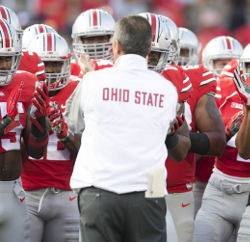Two of the best states for high school football will be voting to go in polar opposite directions when handling transfers.
Florida took the first step in approving a proposal Thursday to essentially create sports free agency, while New Jersey is set to discuss a rule so restrictive that it could come close to ending the perceived epidemic.
The Florida House Ed Committee Bill was proposed on Monday and would remove most obstacles regarding athletic transfers. It passed 13-5 in a vote Thursday and will go to the House floor.
In a 61-page proposal (which can be read here) the members of the FHSAA will be voting on three major changes:
* School choice for athletic purposes – a student may attend one school and play for another.
* Prohibiting private schools and school boards from adopting more stringent rules on transfers.
* Limiting ineligibility to only three (3) criteria: GPA, falsifying information, and impermissible benefits – leaving out age, years of play, etc.
If passed, the bill would also replace the FHSAA governance of the matter with a nine member board, replace the appeal process with a two step conference-then-arbitration standard, and allow schools to belong to multiple athletic associations based on sport.
Many in the state feel the bill will not pass because of the complete lack of regulations.
Josh Wilson has covered the sport for five years, operating FloridaHSFootball.com, and he described the proposal as ludicrous.
“The way the bill reads now, it is saying a 20-year-old can play football at the next zone over so long as he has a 1.5 grade point average,” he said. “I just don’t understand how no one saw a major problem with that. I sure do.
“If this bill passes, it widens the gap; the rich will get richer and the weak will get weaker.”
Conversely, in New Jersey, the NJSIAA is on the verge of splitting its public schools from its non-public schools as well as discussing a bill that may not pass for the opposite reason as Florida.
Restrictions on transfers would make players who go from a ‘closed enrollment school’ — defined as public schools, which admit students from a defined geography — to an ‘open enrollment school,’ which can enroll students outside traditional boundaries. They would be required to sit out the first 30-days of the transfer and would be ineligible to compete in state playoffs.
Students that transfer with an approved change of address would not be required to miss time, regardless of school zoning.
Additionally, the state is trying to curtail the recruitment of eighth grade players as well as the forfeiture of regular season games.
Micahel Zapicchi, the public/non-public committee chair, said in an email to the NJ Herald that the goal of the bill is to help even competitive balance.
“The rule revisions under consideration provide student athletes the opportunity to seek new educational opportunities, while bolstering the integrity of interscholastic sports, helping maintain competitive fairness, and ensuring cooperation and fair play among schools,” the email read.
“Ultimately, we’re trying to identify a means of being as fair as possible to individual students and to teams that count on the proverbial level playing field.”
According to the NJSIAA website of the 1,156 tracked transfers by the state in 2013-14, only two were challenged for athletic advantage and 549 came with bona fide change-of-residence compliance.
Interestingly, the number of transfers from non-public to public outnumbered those from public to non-public, 255 to 186.

